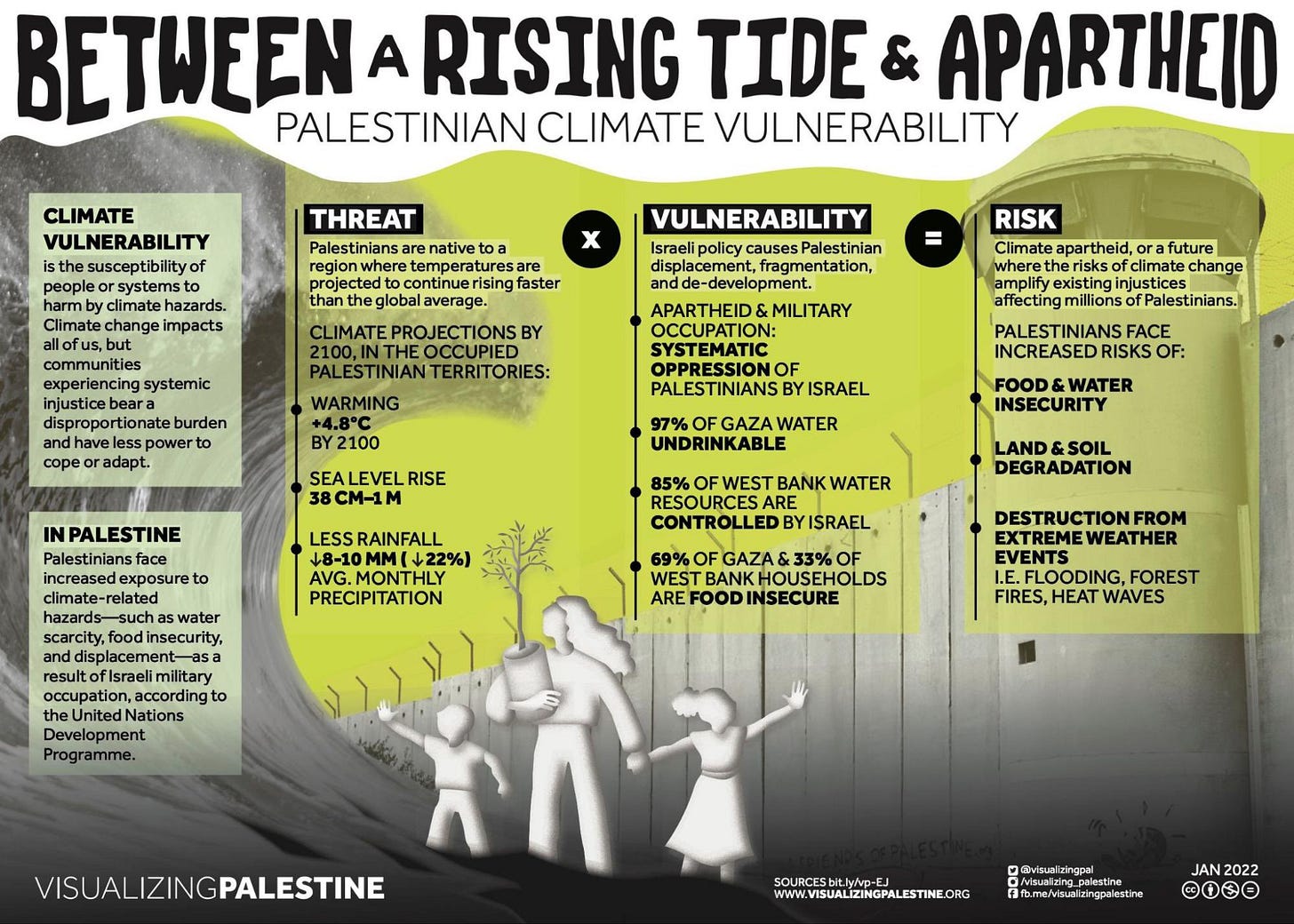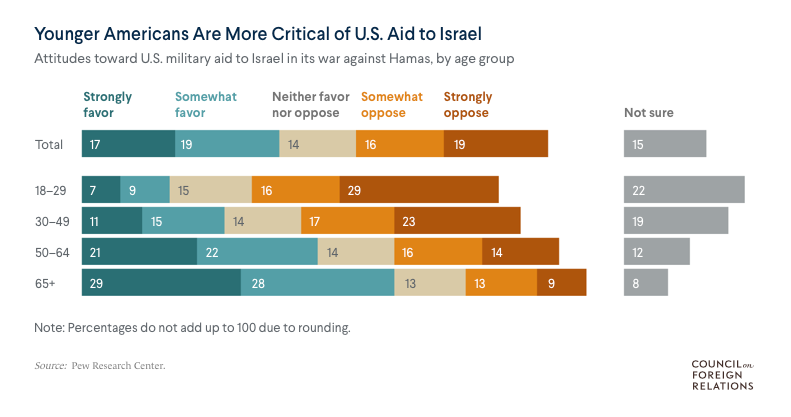3D Roundup: Partners in Crime
Gaza in global context: U.S. military aid to Israel, the geopolitical economy of oil and the future of our planet. Plus a new TNI report on the EU's complicity in genocide.

The 3D Roundup is a special section of The Rift newsletter where I share interesting things to read, watch and listen to. This week we’ll be taking a step back from the colonial violence in Palestine to consider the global context of U.S. military aid to Israel, EU complicity in genocide and the geopolitics of fossil capitalism. Make sure not to miss any future updates:
1️⃣ Watch
The good folks at Common Wealth have recently launched a very exciting new project that looks at the relationship between capitalism and the climate crisis.
It’s called The Break Down, and it will publish “long-form interviews, original essays and resources that break down complex questions about how we got here, what the future might look like, and how we can build the power to change it.”
Adrienne Buller just did an interview with the political economist Adam Hanieh that is very much worth your time. It unravels the threads that link the oppression of the Palestinian people and the West’s long-standing support for Israel to the larger project of Western imperialism and the geopolitical realities of fossil capitalism.
In just half an hour, Adam brilliantly shows how the struggle for Palestinian freedom is intricately interwoven with the future of our planet more generally:
2️⃣ Read
For more on this “geopolitical economy” of oil, make sure to read Adam Hanieh’s recent long-read for the Transnational Institute:
Too often, the politics of Palestine are viewed simply through the lens of Israel, the West Bank, and Gaza, ignoring the wider regional dynamics of the Middle East, and the global context in which Israeli settler colonialism operates. Relatedly, solidarity with Palestine is frequently reduced to the question of Israel’s massive human rights abuses and ongoing violations of international law – the killings, arrests, and dispossession that Palestinians have experienced for nearly eight decades. The problem with this human rights framing is that it depoliticises the Palestinian struggle, failing to explain why Western states continue to support Israel so unequivocally. And when this crucial question of Western support is raised, many point to a ‘pro-Israel lobby’ operating in North America and Western Europe as the cause – a false and politically dangerous viewpoint that gets the relationship between Western states and Israel fundamentally wrong.
My goal in this piece is to present an alternative approach to understanding Palestine – one that is framed by the wider region and the Middle East’s central place in our fossil fuel-centred world. My key argument is that the unstinting support of the US and leading European states for Israel cannot be comprehended outside of this framework. As a settler colony, Israel has been crucial to the maintenance of Western imperial interests – notably those of the US – in the Middle East. It has performed this role alongside the other major pillar of US control in the region: the oil-rich Gulf Arab monarchies, principally Saudi Arabia. The fast-evolving relationships between the Gulf, Israel, and the US are essential to understanding the current moment, especially given the relative weakening of American global power.
Read the full piece here.
How the U.S. supports Israel’s occupation of Palestine—in three charts:
Israel has been the largest cumulative recipient of U.S. foreign aid since its founding, receiving about $310 billion (adjusted for inflation) in total economic and military assistance. The United States has also provided large foreign aid packages to other Middle Eastern countries, particularly Egypt and Iraq, but Israel stands apart.
Source: Council of Foreign Relations.
The United States provided Israel considerable economic assistance from 1971 to 2007, but nearly all U.S. aid today goes to support Israel’s military, the most advanced in the region. The United States has provisionally agreed via a memorandum of understanding (MOU) to provide Israel with $3.8 billion per year through 2028.
Since the start of Israel's war with Hamas on October 7, 2023, the United States has enacted legislation providing at least $12.5 billion in military aid to Israel, which includes $3.8 billion from a bill in March 2024 (in line with the current MOU) and $8.7 billion from a supplemental appropriations act in April 2024.
Source: Council of Foreign Relations.
Recent polls suggest that American adults are divided in their views of U.S. military aid to Israel, with a significant divergence among age groups. Support for military aid to Israel appears strongest among older respondents (ages sixty-five and older) and weakest among younger adults (ages eighteen to twenty-nine).
Source: Council of Foreign Relations.
A new TNI report on the EU’s complicity in the Gaza genocide:
Since the attacks of 7 October, the EU has provided political cover and material support for Israel. This has continued through almost eight months of unrelenting bombardment with almost 40,000 people killed, the forced displacement of 2.3 million people, the fastest descent into starvation of an entire population ever recorded and the total destruction of Gaza’s civilian infrastructure including homes, hospitals, schools and universities, places of worship and bakeries.
This support continued as Israel was placed on trial for genocide at the International Court of Justice (ICJ) in The Hague and as the International Criminal Court (ICC) announced that it would seek arrest warrants for Israel’s prime minister Benjamin Netanyahu and defence minister Yoav Gallant. Were the EU to have applied pressure in October by imposing sanctions, an arms embargo and prohibiting the transit of US military equipment through Europe, Israel’s genocidal war on Gaza may have been curtailed. The EU chose not to act then, and it continues to fail in its legal and moral duty to act now.
This political cover and material support, particularly in light of the ICJ’s interim ruling which put all states on notice of a plausible case of genocide, makes the EU directly complicit in it.
Download the full report here.
BDS co-founder Omar Barghouti on how the student protests have made the struggle against Western complicity go mainstream:
“The current student-led uprising on campuses in the US, Europe and globally is a sign of Palestine’s South Africa moment, as the support for ending complicity in Israel’s genocide and underlying 76-year-old regime of settler-colonialism and apartheid is reaching a tipping point in the struggle for Palestinian liberation … the ‘B’ and ‘D’ in BDS [Boycott, Divest, Sanctions] have gone much more mainstream than before.
“This student uprising has been a crash course on Palestine for millions in the west in particular, undoing many years of silencing and erasing Palestinian voices, Palestinian history, Palestinian culture [and] aspirations … it gives us hope and inspiration in these dark times of Israel’s ongoing genocide against 2.3 million Palestinians in the occupied and besieged Gaza Strip,” Barghouti told the Guardian as Israel continued to defy a ruling by the UN’s top court to stop its assault on Rafah – the southern city of Gaza where Palestinian refugees have painted messages of gratitude to the students on their tents.
Read the full article here.
3️⃣ Listen
As I wrote in my last edition of The Rift, the future of Palestine will depend in large part on what happens in the United States. For this reason, U.S. politics and the student protests on U.S. campuses take on outsize importance.
This brilliant episode of The Dig podcast, with Dylan Saba and Waleed Shahid, takes a closer look at this profound turning point in U.S. history, where left-internationalist critiques of U.S. imperialism and Israeli settler colonialism are making a dramatic comeback in a new cycle of struggles. It’s two hours long, but worth every minute:
That’s it for this week! If you liked the 3D roundup and would like to keep receiving it in your inbox, you can sign up to The Rift newsletter or upgrade your subscription here:







